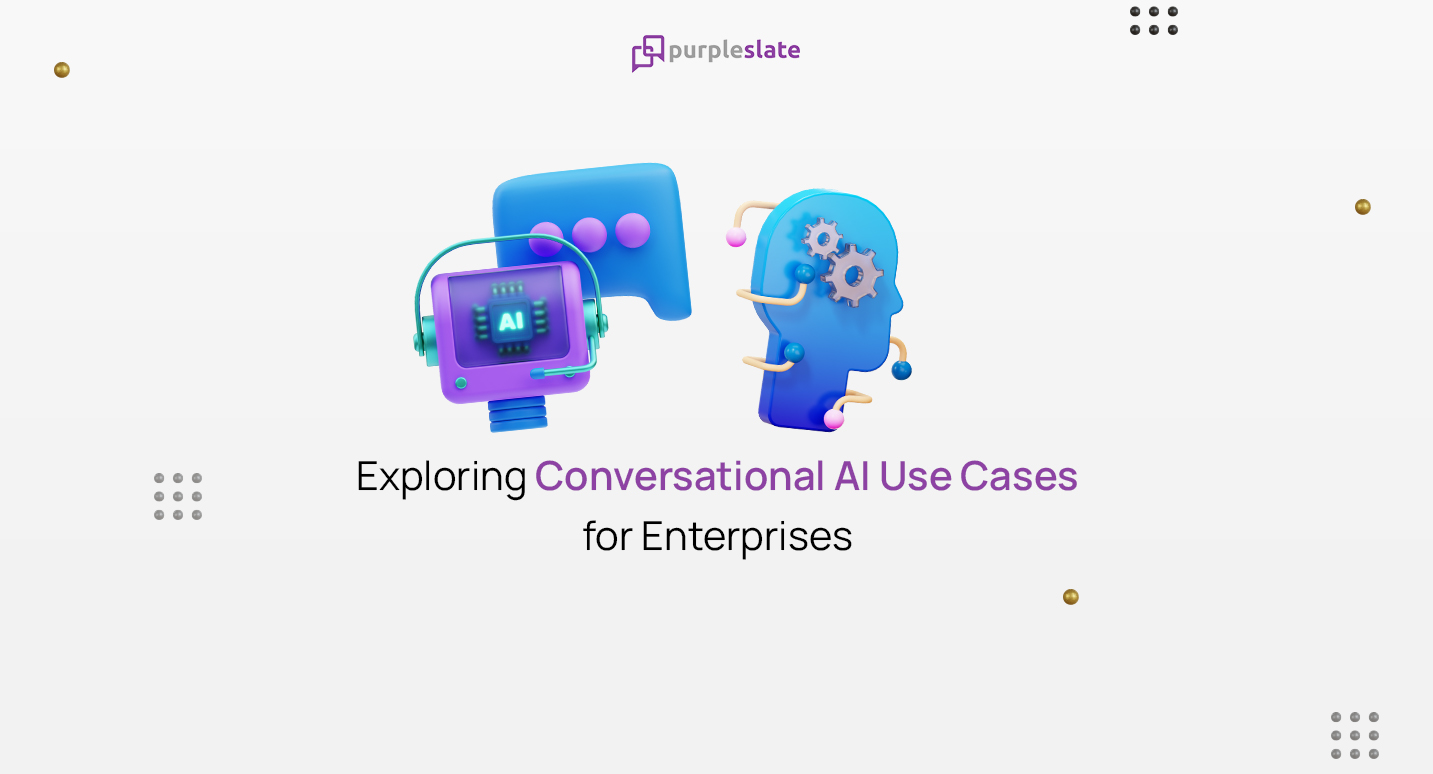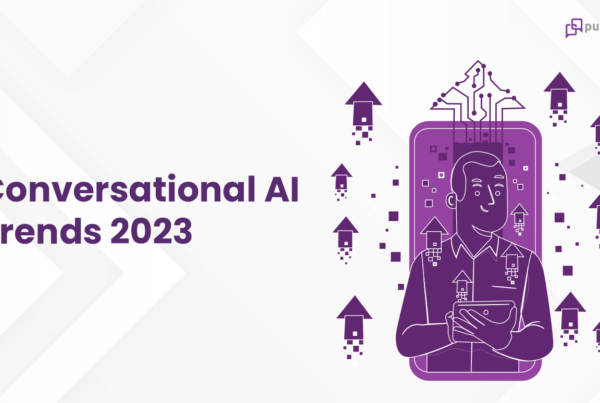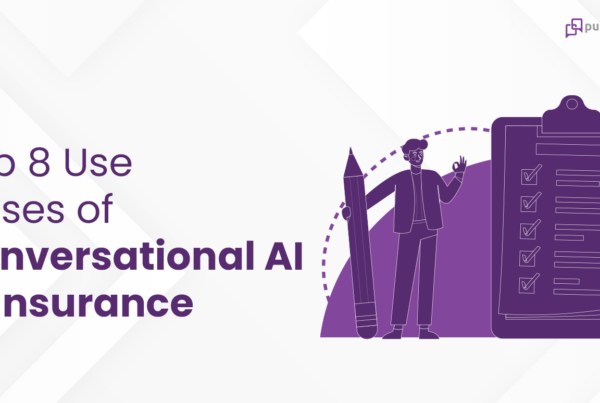
Introduction
As technology continues to advance at a rapid pace, businesses are constantly seeking new ways to streamline processes, improve customer service, and enhance overall efficiency. One area that has seen tremendous growth and potential is Conversational AI Services, particularly in the form of chatbots. These intelligent virtual assistants are revolutionizing the way enterprises interact with customers, employees, and partners. From customer support and sales to HR and operations, Conversational AI Chatbots are unlocking new possibilities and transforming the way businesses operate. In this blog, we will explore the various use cases of Conversational AI for enterprises and delve into the benefits they can offer.
Understanding the potential of Conversational AI for Enterprises
Conversational AI has emerged as a powerful tool for enterprises, holding immense potential for enhancing customer experiences and improving internal processes. By leveraging natural language processing and machine learning algorithms, Conversational AI enables organizations to automate various interactions and tasks through chatbots or virtual assistants.
In customer support, Conversational AI chatbots can provide instant and accurate responses to common queries, reducing wait times and providing 24/7 assistance. Moreover, these chatbots can understand customer sentiment and emotions, enabling a more personalized and empathetic interaction.
Beyond customer service, Conversational AI can be employed in sales and marketing to enhance lead generation and conversions. Through personalized conversations, chatbots can understand customer preferences, recommend products or services, and guide them through the sales process, resulting in a more efficient and tailored approach.
Furthermore, Conversational AI has proven beneficial in streamlining HR operations. Chatbots can assist in recruitment by screening resumes, scheduling interviews, and answering candidate queries. They can also provide onboarding support, helping new employees navigate company policies and procedures.
Lastly, Conversational AI can contribute to improving internal collaboration and knowledge sharing. Virtual assistants can assist employees by answering their questions, providing access to information, and guiding them through complex workflows, enabling teams to work more efficiently and productively.
Overall, the potential of Conversational AI in enterprises is vast, with applications ranging across various departments and functions. By leveraging this technology, organizations can not only enhance customer experiences but also automate and optimize their internal processes.
Enhancing Customer Experience through Conversational AI
As technology continues to advance, businesses are constantly searching for ways to provide better customer experiences. Conversational AI offers a unique solution to this challenge, allowing enterprises to enhance customer interactions and satisfaction levels.
By implementing Conversational AI chatbots, organizations can provide instant and accurate responses to customer queries, eliminating the need for customers to wait for assistance. This not only saves time, but also improves customer satisfaction and loyalty.
Also, these chatbots can understand customer sentiment and emotions, enabling a more personalized and empathetic interaction. They can adapt their responses based on the tone and language used by the customer, making the conversation feel more natural and human-like.
Furthermore, Conversational AI can be used to proactively engage customers and provide personalized recommendations. By analyzing customer data, chatbots can suggest products or services that are aligned with their preferences and needs, increasing the likelihood of conversions.
Streamlining internal processes with Conversational AI
In addition to improving customer interactions, Conversational AI can streamline internal processes within enterprises. By integrating chatbots into internal communication systems, organizations can automate routine tasks and increase efficiency.
For example, Conversational AI can be used to automate employee onboarding processes. Chatbots can guide new hires through the necessary paperwork, collect required information, and provide answers to common questions. This frees up HR teams to focus on more strategic initiatives, ultimately saving time and resources.
Similarly, chatbots can assist with IT support by providing automated troubleshooting guides and resolving common technical issues. This reduces the number of IT tickets and allows the IT team to allocate their time and resources to more complex problems.
Another use case is project management. Conversational AI can help teams stay organized by sending task reminders, scheduling meetings, and providing updates on project progress. This empowers employees to stay on track and ensures that projects are completed on time.
Leveraging data and insights with Conversational AI
Conversational AI not only streamlines internal processes and saves time but also harnesses the power of data and insights for enterprises. By integrating Conversational AI into various systems and platforms, organizations can gather valuable data about their employees, customers, and operations.
One key use case is in customer service. With Conversational AI, companies can collect and analyze customer interactions in real-time, identifying trends, patterns, and areas of improvement. This valuable information can then be used to enhance customer experiences, personalize recommendations, and optimize products and services.
Moreover, Conversational AI can be leveraged to gather employee feedback. By engaging employees in conversational surveys and assessments, organizations can gain deep insights into employee satisfaction, engagement levels, and areas for improvement. This data can inform HR strategies, talent development initiatives, and overall employee well-being programs.
Furthermore, Conversational AI enables organizations to make data-driven decisions by providing real-time reporting and analytics. Automated dashboards can present key performance indicators, operational metrics, and insights, empowering leaders to take proactive actions and drive business growth.
Exploring industry-specific use cases for Conversational AI
In addition to the wide range of benefits that Conversational AI brings to enterprises, this powerful technology also offers industry-specific use cases that can unlock new possibilities for businesses in various sectors. Let’s explore some of these use cases and how they can revolutionize different industries.
Healthcare: Conversational AI can improve patient experiences by providing virtual triage, answering frequently asked questions, and even offering personalized health recommendations. It can also streamline administrative processes, such as appointment scheduling and medical record management.
Retail: With Conversational AI, retailers can create personalized shopping experiences by offering virtual shopping assistants, enabling customers to find products, make purchases, and get recommendations with ease. Additionally, Conversational AI can support efficient inventory management and order tracking.
Banking and Finance: Conversational AI can enhance customer support in the banking industry by providing smart virtual assistants for account inquiries, transaction assistance, and even personalized financial advice. It can also detect potential fraudulent activities and offer real-time risk assessments.
Hospitality: In the hospitality industry, Conversational AI can provide virtual concierge services, helping guests with reservations, room service requests, and local recommendations. It can also facilitate efficient communication between staff members, improving service delivery.
These are just a few examples of the many industry-specific use cases for Conversational AI. As technology advances and more businesses embrace this innovative solution, we can expect to see even more exciting applications in sectors like manufacturing, logistics, and education.
Key considerations before adopting Conversational AI in your enterprise
Before diving into the world of Conversational AI, it’s important for businesses to consider a few key factors to ensure a smooth and successful integration. Here are some factors that enterprises should keep in mind before adopting Conversational AI:
Define your objectives: Clearly outline your goals and objectives for implementing Conversational AI. Determine what you hope to achieve and how this technology can contribute to your overall business strategy.
Understand your target audience: Gain a deep understanding of your target audience’s preferences, behaviors, and needs. This knowledge will help you design an effective Conversational AI solution that caters to their specific requirements.
Choose the right platform: Evaluate different Conversational AI platforms and providers to find the one that best fits your business needs. Consider factors such as scalability, customization options, and integration capabilities.
Ensure data security and privacy: As Conversational AI involves handling sensitive customer information, it’s crucial to prioritize data security and privacy. Choose a platform that adheres to strict security protocols and compliance standards.
Provide continuous training and monitoring: Conversational AI systems require ongoing training and monitoring to ensure they deliver accurate and relevant responses. Establish processes for updating and improving your AI models regularly.
Plan for scalability: Consider the future growth of your enterprise and the scalability of your Conversational AI solution. Choose a platform that can handle increased demand and accommodate business expansion.
By carefully considering these factors, businesses can make informed decisions about adopting Conversational AI and ensure its successful implementation.
Conclusion
In conclusion, embracing Conversational AI opens up a world of possibilities for businesses seeking to enhance their customer engagement strategies. By implementing the right Conversational AI solution, enterprises can revolutionize the way they communicate with their audience and unlock new opportunities for growth.
Conversational AI is transforming the customer experience by providing personalized and efficient interactions. With AI-powered chatbots and virtual assistants, businesses can offer 24/7 support, handle multiple inquiries simultaneously, and deliver immediate responses. This not only improves customer satisfaction but also reduces customer service costs.
Moreover, Conversational AI enables businesses to gather valuable insights from customer interactions. Through advanced analytics, enterprises can understand customer preferences, gather feedback, and identify areas for improvement. This data-driven approach allows for targeted marketing campaigns and personalized recommendations, fostering customer loyalty and driving sales.
By embracing Conversational AI, businesses can stay ahead of the competition and meet the evolving expectations of their audience. It’s time to unlock the potential of AI-powered conversations and revolutionize your customer engagement strategies.
So why wait? Embrace the future of e-commerce today by incorporating chatbots into your online store. Your customers will thank you, and your bottom line will too!




